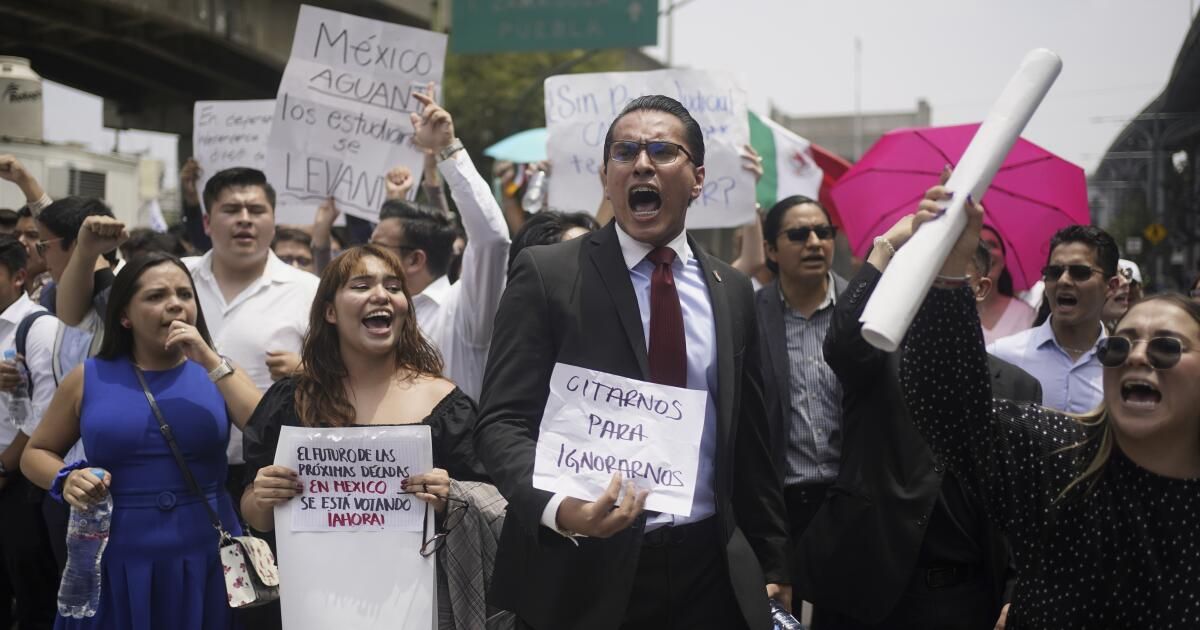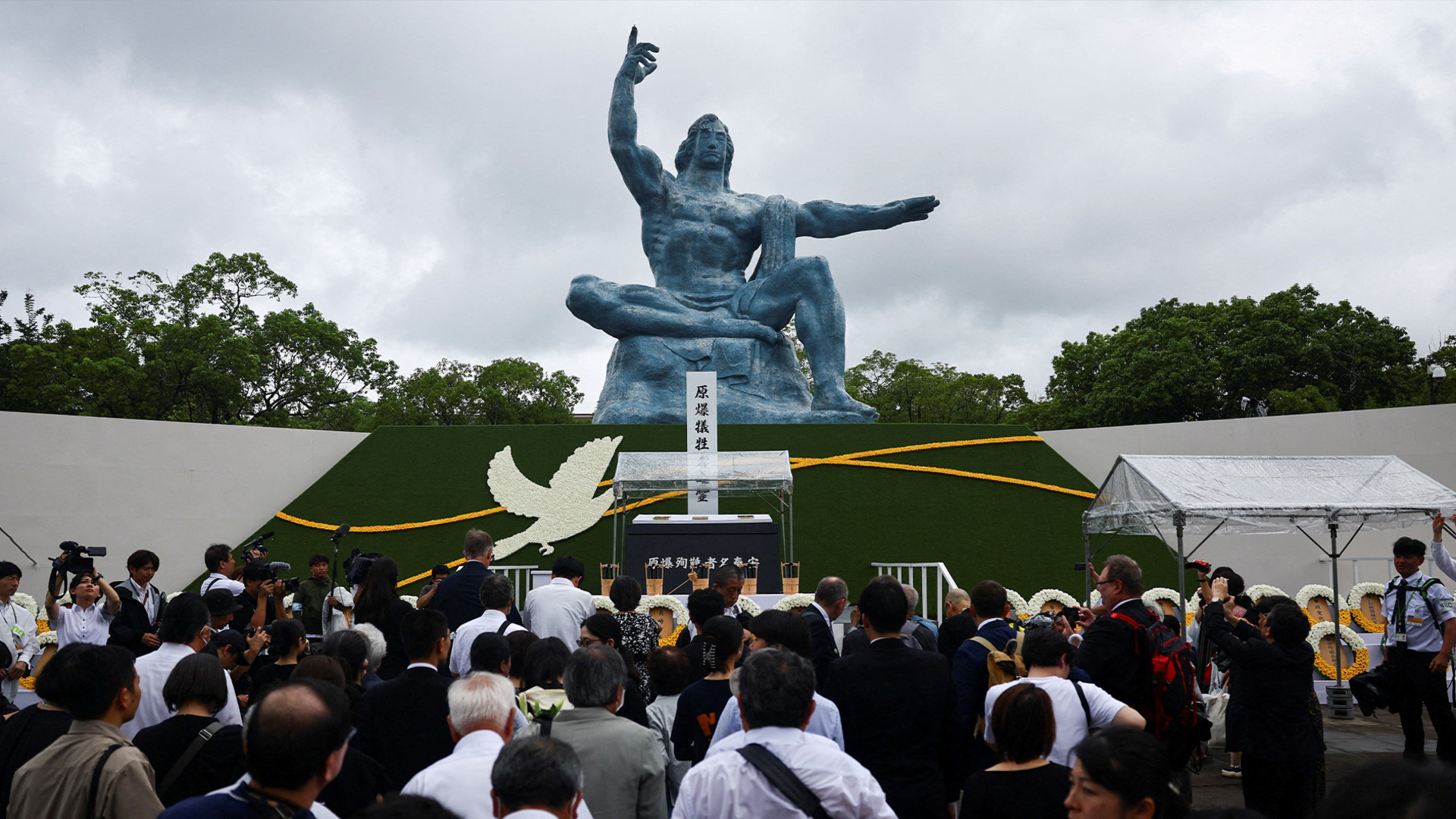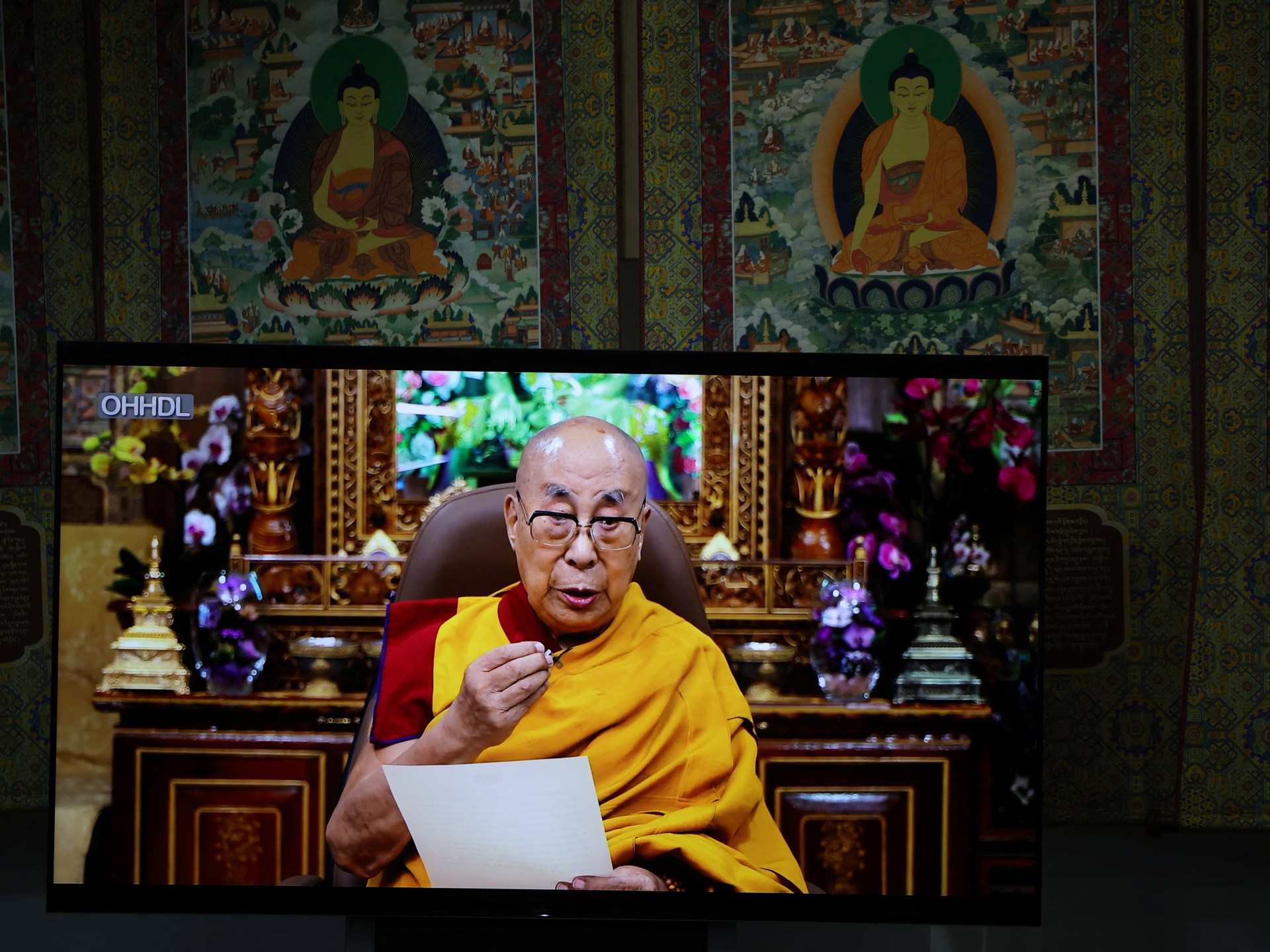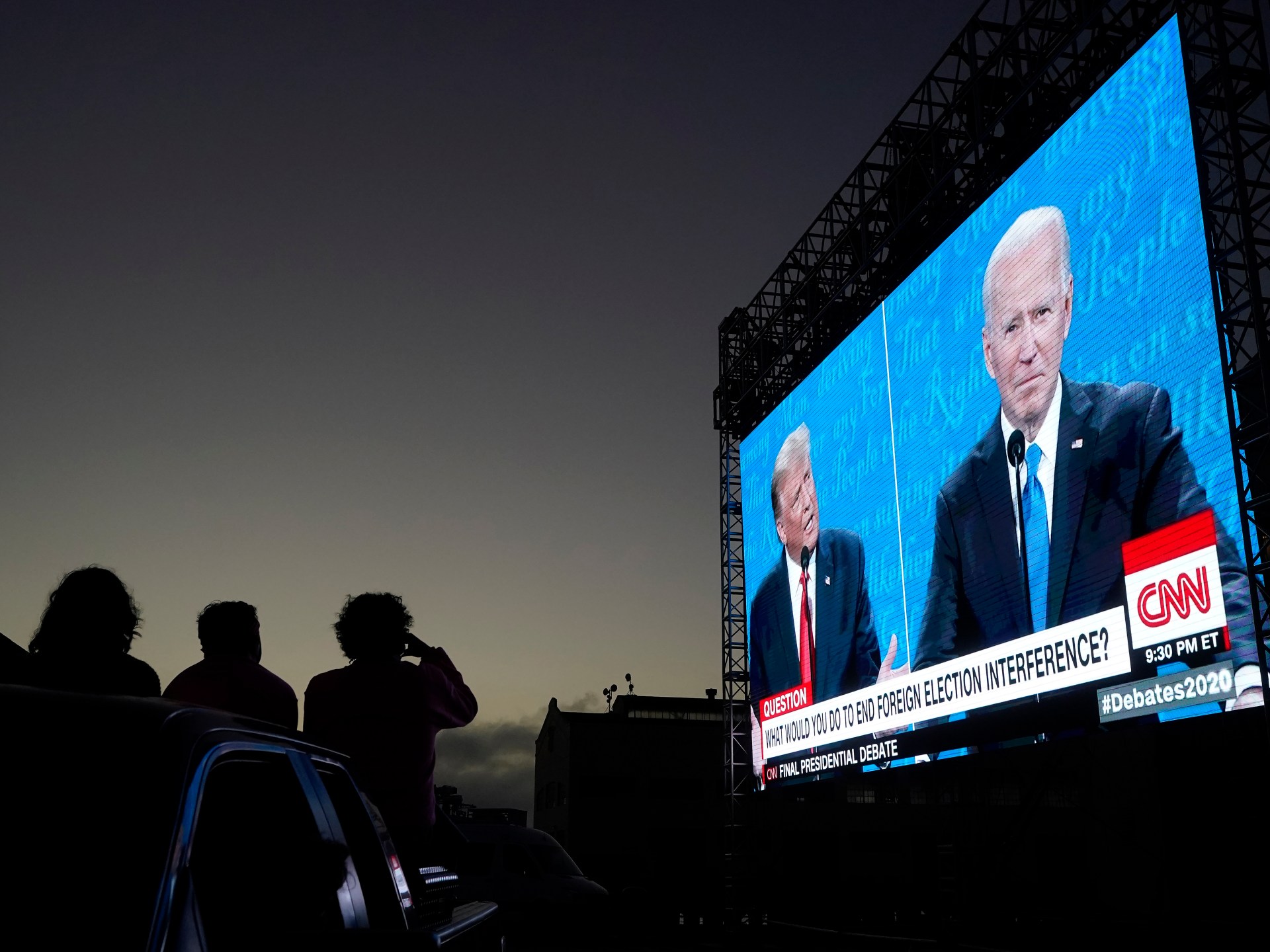Three weeks before the end of his presidency, Andrés Manuel López Obrador could be taking victory laps.
Mexico's leftist leader has slashed poverty and tripled the minimum wage. He has a 73% approval rating — virtually unheard of for an outgoing president — and will be succeeded on Oct. 1 by a loyal protégé who has vowed to continue his signature policies.
Morena, the political party that López Obrador officially incorporated just a decade ago, now controls both houses of Congress and most of the country's 32 states.
But instead of rejoicing in his successes, López Obrador has been looking for a fight.
Mexican President Andrés Manuel López Obrador greets supporters at the Zócalo in Mexico City this month.
(Félix Márquez / Associated Press)
He has plunged the country into chaos by pushing through a controversial constitutional change that would dramatically overhaul Mexico's justice system by requiring all judges in the country — including members of the Supreme Court — to run for office.
López Obrador's plan has been criticized by the business community, Mexico's major trading partners and the country's legal professionals, including thousands of judges and other court employees who have been on strike for weeks in protest.
The peso has plummeted to its lowest exchange rate against the dollar in nearly two years, and protesters have filled the streets daily, claiming the president's plan would eliminate crucial democratic checks and balances, facilitate corruption and pack the courts with judges loyal to the ruling party.
When the lower house of Congress voted to approve the president’s proposal — clearing the way for a vote in the Senate as early as this week — lawmakers were forced to gather inside a sports stadium because the doors to Congress had been blocked by angry protesters.
For longtime critics of the president, the judicial proposal is further evidence of López Obrador's disdain for democratic institutions and his desire to consolidate power.
“We saw this coming for a long time,” said Carlos Bravo Regidor, a political analyst, citing López Obrador’s attacks on other independent institutions, including a failed attempt to dismantle the National Electoral Institute.
But some López Obrador supporters are also sounding alarm about his proposal, warning that it could jeopardize his legacy as a champion of the poor who reduced income inequality and connected with the working class like few leaders before him.
Some have questioned why López Obrador is using his final days in office to push through a divisive measure that will leave his successor, Claudia Sheinbaum, with a host of political and economic challenges that did not exist when she won the election in a landslide just three months ago.
“The president is putting obstacles in the way of her entry into government; she will begin her mandate with a serious political problem,” said Carlos Pérez Ricart, a professor of international relations at the Center for Economic Research and Teaching. If the reform is approved, Sheinbaum will spend her first critical months in office implementing drastic changes to the judiciary, including organizing nationwide elections, and doing damage control to reassure frightened investors, he said.
Pérez has praised other López Obrador policies but called the president’s push for judicial reform “an outburst of madness” and compared him to other popular leaders around the world “who have destroyed their political projects” by stretching their term limits.
López Obrador, 70, who ran for president and lost twice before being elected in 2018, has completely transformed Mexico’s political landscape during his six years in office, turning a grassroots leftist social movement into the country’s dominant political party. He is barred by the constitution from running for a second term.
Promising to root out widespread corruption and “put the poor first,” he cut funding for most government agencies and created a vast system of welfare payments for the elderly and young.
It also gave the military control over a range of civilian functions, from building airports and rail lines to operating ports, and hampered the work of independent government institutions, including the National Institute for Transparency, Access to Information and Protection of Personal Data, which ensures public access to information.
Some of his efforts to expand executive power — such as a proposal to radically reform the electoral institute — were rejected by the courts.
López Obrador has harshly criticized the country’s judges, accusing them of being corrupt and serving the interests of the “power mafia” of economic elites that he says controls Mexico. Earlier this year, he proposed removing them all and having future judges elected by popular vote.
“It’s a thirst for power,” Bravo said of López Obrador. “What motivates this is a feeling of revenge against the autonomous institutions that restricted or limited what he wanted to do.”
Initially, López Obrador did not have the support to approve a constitutional change, which requires a two-thirds majority in both houses of Congress and the approval of at least half of the country's state legislatures.
Then came Morena’s landslide victory in June elections, in which the party won a supermajority in the lower house of Congress and came close to one in the Senate, putting constitutional changes suddenly within reach.
“This opened an unexpected window that he is taking advantage of,” Bravo said.
In Mexico's current judicial system, those aspiring to become federal judges must undergo training, pass public exams and be evaluated by a supervisory board. The president nominates three candidates for each vacancy on the Supreme Court and the Senate approves one.
Under the new reform, eligibility for some judgeships would require a law degree and a letter of recommendation from someone. A committee would select candidates before placing them on the ballot. It is unclear how many candidates could run in a given race.
Meanwhile, the number of justices on the Supreme Court would be reduced from 11 to nine, and their terms would be shortened from the current 15 to 12 years.
Critics of the proposed plan warn that elections would turn judges from impartial interpreters of the law into political actors who could make decisions to win votes or please campaign donors, including criminal organizations.
“This exacerbates the problem of corruption because judges will be catering to special interests,” said Amrit Singh, a professor at Stanford Law School. “In a country like Mexico, where organized crime is so powerful, that is a particular problem because there is a risk that organized crime will be the group that can most effectively capture the judiciary.”
The changes proposed by López Obrador “seem existentialist,” Singh said. “It’s a really drastic measure that is fundamentally contrary to the rule of law.”
“That would put an end to an independent institution that has repeatedly faced down López Obrador’s attempts to seize power,” he said.
Proponents of the plan point out that some state judges in the United States are elected by popular vote, although federal judges and Supreme Court justices are appointed.
Singh said the United States should not be a model, citing studies showing that state judges are predisposed to rule in favor of campaign donors.
Mexico’s justice system is not perfect and could use changes, Singh said. But he added that López Obrador’s plan would make much worse the things he criticizes: favoritism and corruption. “It’s going to destroy any vestige of justice left in Mexico,” he said.
“This is populist authoritarianism in action,” Singh said. “These reforms are said to be in support and service of the people, but in reality what they are doing is giving the government carte blanche to do whatever it wants without any checks and balances.”
But López Obrador frames the proposal as part of his broader quest to make Mexico more equal.
He seems proud that U.S. and Canadian officials and business leaders on both sides of the border oppose the proposal, which they say could jeopardize investment in Mexico.
“Corrupt judges, ministers, magistrates… continue to defend foreign companies that come to plunder, steal and harm the economy of the Mexican people,” he said.
Polls show that less than half of Mexicans support judicial reform and that many do not understand the details of the proposal.
Still, López Obrador has plenty of supporters. In his final state of the nation address this month, he asked the crowd of thousands gathered in Mexico City’s central plaza to raise their hands if they supported the judicial plan. A sea of guns went up.
Read more Coverage of Mexico and the Americas.












